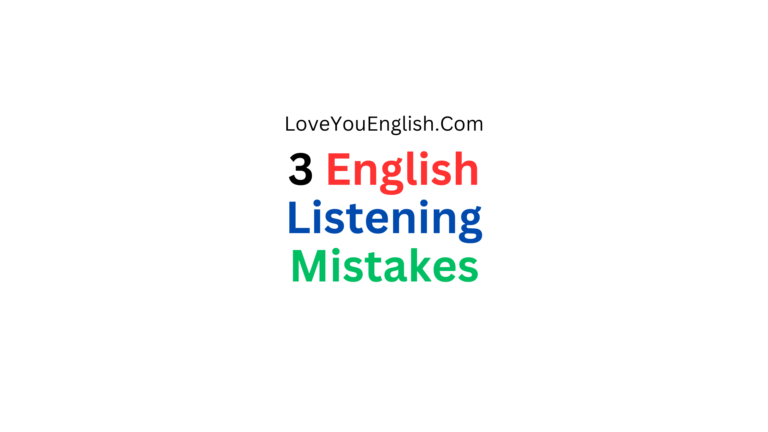A Guide to Improving Daily Communication
Hello everyone,
Today I’m going to talk to you about 5 things that you can practice every single day to improve your English.
Learning a language is like learning to play a musical instrument.
You can’t just pick up a guitar and know how to play it. Or at least I didn’t when I learnt the guitar.
You have to practice a little bit every single day and over time you will improve and become fluent.
You can’t just practice loads the day before an exam and expect to be perfect at playing that guitar.
It’s exactly the same for languages. The best way to learn a language is to practice a little bit every single day, and in this lesson, I’m going to give you 5 different ways that you can incorporate English or any other language into your daily life.
I think that quite a few of these you won’t have heard before, so let’s get straight into it.
Number one, and I am so excited to be able to mention one of my favorite things to listen is to follow an audio soap opera. What is a soap opera, I hear you ask?
Well, I shall tell you a soap opera is a daily serial or series dealing with the daily lives and events of the same group of characters, normally in the same location.
Most commonly they are on television. We have lots on OTT platforms the, like Person of Interest, Grey’s Anatomy, How I Met Your Mother. But I’m recommending you listen to an audio one, and there’s one in particular I would like to recommend.
I really, really recommend a radio soap opera by the BBC, Radio 4 called The Archers. It’s special for so many reasons, not least because it is the longest running drama in history. It was started in 1950, first aired in 1951. And also because I think it is absolutely perfect for English learners.
Explore more topics:
Pronouns – Definition, Types and Examples
Let’s Talk About Culture: Vocabulary & Phrases
The Benefits of Teaching Online from Home
The Benefits of Teaching Online from Home
It follows the daily lives and dramas of a group of fictional characters in the fictional countryside village of Ambridge. Each episode is around 12 to 14 minutes long.
I’m not quite sure exactly how long, but it’s definitely under 15 minutes. It’s spoken in relatively clear English in a variety of British accents and sometimes not British accents as well other accents, but it’s fantastic because the Plot Summary is posted on the BBC website.
And the great thing about this is that it deals with daily happenings, which is great for your life too. Current events, routine things, and you can repeat all of the parts that you missed.
It’s on every single day. Apart from Saturday, they have a rest, and once a week they condense all of the week’s episode into one, and that’s called an omnibus, and that’s around 75 minutes long. I love listening to The Archers when I am free.
I listen to it every single day and if I miss one then I always catch up. There is no beginning and there is no finish to the series. There aren’t any seasons, so it might take you a couple of episodes to get used to the storylines and to work out who is who and to recognize the different voices.
Give it five or six episodes and you’ll feel really included. It’s wonderful because it’s free to listen to. It’s beautifully produced and there is a huge community of Archers fans.
A lot of them are older, but a lot of them are younger too.
And if you search hashtag The Archers on Twitter, big tip here, you’ll see lots of people talking and discussing the topics of the episode. And maybe you could interact with them.
And I really hope some of you take up this opportunity to listen to a daily English audio soap opera.
10 to 15 minutes every day is definitely going to help your listening, it’s going to help your pronunciation, and it’s just going to help your general enjoyment as well, because it’s a great program, right?
Before I get too passionate, let’s move on to a piece of advice #2.
So, #2 is talk daily with natives now, I bet so many of you are thinking. I wish I would love to talk to natives every day, but I don’t know how, and no one seems to want to talk to me.
Well, I have a couple of suggestions. One is paid for, and one is free, and the best thing in my opinion would be a combination of the two.
So, a combination of both paid for classes and language exchanges would be amazing because you can take what you’ve learned and heard in the language exchange and verify it with your teacher for an extra layer of security to make sure that you’re not making any mistakes.
Now on to tip #3, set yourself a daily word goal. Learn X number of words every single day. This tip is really important because it also links to tip #4.
I actually have a really important extra layer to this strategy that I would like to discuss with you.
In order to build your vocabulary quickly, you need to learn at least one new word per day, but hopefully more than that.
I’ve written to you before about keeping a word diary or just a notebook or a list on your phone. Keep it with you all the time and always be aware wherever you are.
Do I know that word in English? Do I know how to say that in English? You might see a tree. Do I know how to say that specific variety of tree in English?
If you don’t, write it down in your own language, in this book, in this list. And then at the end of the day, before you go to sleep, research all of these words and translate them into English.
It will help you train your brain to always be hungry for English.
After a few weeks, you will always be looking for new words that you can learn, words that you didn’t even realize you didn’t know. Now there is something else that you can do with these words.
And this brings me on to point #4.
Write a daily journal with a difference depending on your level. I would buy a paper journal or diary. I get so tired in the evenings I can’t spend loads and loads of time writing.
So, I personally would buy a work week planner. Or a homework planner.
Or a study planner where you’ve got all seven days across 2 pages.
In each of those days, I would write three or four sentences about my day, trying to incorporate those words that I learned in my daily word list, the words I mentioned in #3.
That way not only is you learning the new words and learning what they mean, but you’re making sure they’re fully integrated into your brain.
And also doing this before you go to sleep will mean they stick in there even more than you can wake up in the morning. Read what you wrote the night before and you’ve got those words fresh in your head, ready for the day ahead.
It’s honestly such a fabulous technique because it builds your vocabulary, it improves your writing skills, it improves your reading skills. If you search the pronunciation of the word, it will improve your pronunciation and your listening skills.
And if you book in sessions with language teachers, you can have them correct your writing.
So, every week you can bring them two fresh pages of writing for them to correct. Honestly, if you do this every day, it will help you so much.
For the last point, point #5. The tip is to perform daily translations of subjects you are interested in. Now, I know a lot of you want to stop translating and think in English.
However, I think translation forms a very, very important part of language learning, especially when it’s around something that you are interested in.
It’s really, really good to compare how things are said in different languages, and translation helps you with that. In my opinion, the best way to practice your translation is absolutely free.
Which is fantastic, and on YouTube. Pick the Youtubers that you really, really like, the Youtubers that talk about subjects that you’re interested in.
Maybe it’s photography, maybe it’s technology, maybe it’s pets, maybe it’s makeup. You can actually contribute to subtitle translations.
You can translate videos from your native language into English, that would be a really good way to practice, but even translating English subtitles into your own native language is a really good reading and translation exercise.
I have discussed all five points. I really hope you’ve learned something. I really hope you try out one of my five recommendations.
Learning a language is like learning a music.
Thank you so much for your time reading this.






